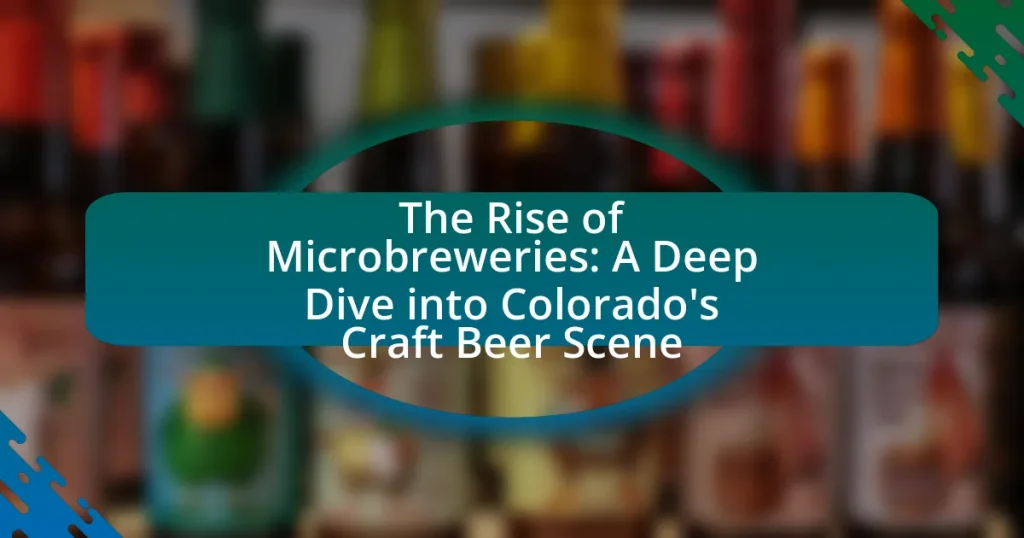Microbreweries are small-scale breweries that prioritize quality and unique brewing techniques, playing a significant role in Colorado’s vibrant craft beer scene. Emerging during the craft beer revolution of the 1980s and 1990s, Colorado now boasts over 400 craft breweries, with microbreweries contributing to local economies and cultural identity. This article explores the defining characteristics of microbreweries, the impact of local ingredients, the popularity of the craft beer movement, and the innovative brewing techniques employed by these establishments. Additionally, it highlights notable microbreweries, the influence of local regulations, and ways consumers can engage with Colorado’s thriving craft beer culture.

What are Microbreweries and How Did They Emerge in Colorado?
Microbreweries are small-scale breweries that produce limited quantities of beer, typically focusing on quality, flavor, and unique brewing techniques. In Colorado, microbreweries emerged in the late 20th century, particularly during the craft beer revolution of the 1980s and 1990s, when a growing interest in artisanal and locally produced beverages led to the establishment of numerous independent breweries. By 2023, Colorado had over 400 craft breweries, with microbreweries playing a significant role in this growth, reflecting the state’s culture of innovation and community engagement in the craft beer industry.
What defines a microbrewery in the context of Colorado’s craft beer scene?
A microbrewery in Colorado’s craft beer scene is defined as a brewery that produces less than 15,000 barrels of beer annually and primarily sells its products directly to consumers. This definition aligns with the Brewers Association’s criteria, which emphasizes small-scale production and a focus on quality, flavor, and traditional brewing methods. In Colorado, microbreweries contribute significantly to the local economy and culture, with over 400 operating establishments as of 2023, showcasing a diverse range of styles and flavors that reflect the state’s unique brewing heritage.
How do production limits differentiate microbreweries from larger breweries?
Production limits differentiate microbreweries from larger breweries by defining the scale of production, with microbreweries typically producing less than 15,000 barrels annually. This limit is established by the Brewers Association, which classifies microbreweries based on their production volume and emphasizes their focus on quality, flavor, and traditional brewing methods. In contrast, larger breweries often exceed this production threshold, allowing them to benefit from economies of scale, broader distribution, and increased market presence. The distinction in production capacity not only influences the operational strategies of these breweries but also shapes their identity within the craft beer community.
What role do local ingredients play in Colorado’s microbreweries?
Local ingredients are essential in Colorado’s microbreweries as they enhance the uniqueness and quality of the craft beers produced. By sourcing hops, grains, and other components from local farms, these breweries create distinctive flavors that reflect the region’s terroir. For instance, Colorado’s diverse climate allows for a variety of hops to thrive, contributing to the state’s reputation for innovative and flavorful brews. Additionally, using local ingredients supports the local economy and fosters community relationships, which are integral to the microbrewery culture in Colorado. This commitment to local sourcing is evident, as many breweries proudly highlight their use of Colorado-grown ingredients on their labels and marketing materials.
Why has the microbrewery movement gained popularity in Colorado?
The microbrewery movement has gained popularity in Colorado due to a combination of a strong craft beer culture, supportive legislation, and a growing consumer preference for locally sourced products. Colorado boasts over 400 breweries, making it one of the leading states in craft beer production, which reflects the state’s rich brewing heritage and community support. Additionally, legislation such as the Colorado Craft Beer Act has facilitated the growth of microbreweries by reducing regulatory barriers, allowing for easier establishment and operation. This environment has fostered innovation and creativity among brewers, attracting consumers who seek unique and high-quality beer experiences.
What cultural factors contribute to the rise of craft beer in Colorado?
The rise of craft beer in Colorado is significantly influenced by a culture of localism and community engagement. This cultural emphasis encourages consumers to support local businesses, fostering a strong connection between breweries and their communities. Additionally, Colorado’s outdoor lifestyle promotes social gatherings and events centered around craft beer, enhancing its popularity. The state’s history of brewing, coupled with a diverse population that values innovation and quality, further contributes to the craft beer movement. For instance, as of 2021, Colorado ranked first in the nation for the number of craft breweries per capita, highlighting the state’s robust craft beer culture.
How has the craft beer community influenced local economies?
The craft beer community has significantly influenced local economies by creating jobs, boosting tourism, and increasing local tax revenues. In Colorado, for example, the craft beer industry supports over 10,000 jobs and contributes approximately $1.1 billion to the state’s economy annually. Additionally, craft breweries attract tourists, with over 1.5 million visitors touring breweries in Colorado each year, further stimulating local businesses such as restaurants and hotels. This economic impact is reinforced by the fact that craft breweries often source ingredients locally, fostering relationships with local farmers and suppliers, which enhances the overall economic ecosystem in their communities.
What are the Key Characteristics of Colorado’s Craft Beer Scene?
Colorado’s craft beer scene is characterized by a diverse array of microbreweries, innovative brewing techniques, and a strong community focus. The state boasts over 400 craft breweries, making it one of the leading states in the U.S. for craft beer production. This vibrant scene is supported by a culture of experimentation, with breweries frequently introducing unique flavors and styles, such as barrel-aged beers and sour ales. Additionally, Colorado’s craft breweries often emphasize local ingredients, contributing to the state’s economy and promoting sustainability. The annual Great American Beer Festival, held in Denver, further highlights the significance of Colorado’s craft beer industry, showcasing thousands of beers from across the country and attracting beer enthusiasts worldwide.
How does Colorado’s craft beer scene compare to other states?
Colorado’s craft beer scene is one of the most prominent in the United States, ranking among the top states for craft breweries per capita. As of 2023, Colorado boasts over 400 craft breweries, which is significant compared to states like California and Texas, which have larger populations but fewer breweries per capita. The Brewers Association reported that Colorado has a craft brewery density of approximately 7.2 breweries per 100,000 adults, highlighting its strong local culture and community support for craft beer. Additionally, Colorado’s craft beer industry contributes significantly to the state’s economy, generating over $3 billion annually, which further underscores its importance compared to other states.
What unique styles of beer are prevalent in Colorado’s microbreweries?
Unique styles of beer prevalent in Colorado’s microbreweries include the Colorado-style IPA, barrel-aged stouts, and farmhouse ales. Colorado’s craft beer scene is characterized by a strong emphasis on hop-forward flavors, with many breweries creating their own interpretations of IPAs that showcase local ingredients. Additionally, barrel-aging techniques are widely used, resulting in rich, complex stouts that often incorporate flavors from the barrels, such as whiskey or wine. Farmhouse ales, inspired by traditional Belgian styles, are also popular, featuring unique yeast strains and often incorporating local fruits and spices. These styles reflect Colorado’s diverse brewing culture and commitment to innovation.
How do local regulations impact the craft beer industry in Colorado?
Local regulations significantly impact the craft beer industry in Colorado by shaping operational practices, licensing requirements, and distribution channels. For instance, Colorado’s laws allow breweries to sell directly to consumers, which fosters a direct relationship between brewers and customers, enhancing sales and brand loyalty. Additionally, regulations regarding alcohol content, labeling, and health standards ensure product safety and compliance, which are crucial for maintaining consumer trust. The state also has specific laws governing the number of licenses a brewery can hold, influencing market competition and growth opportunities. These regulatory frameworks have contributed to Colorado being home to over 400 craft breweries, making it one of the leading states in the craft beer movement.
What are the most notable microbreweries in Colorado?
The most notable microbreweries in Colorado include Avery Brewing Company, Odell Brewing Company, and Left Hand Brewing Company. Avery Brewing Company, established in 1993 in Boulder, is renowned for its innovative beers and has won numerous awards, including a gold medal at the Great American Beer Festival. Odell Brewing Company, founded in 1989 in Fort Collins, is recognized for its flagship IPA and has consistently received accolades for quality and sustainability practices. Left Hand Brewing Company, based in Longmont since 1994, is famous for its Milk Stout and has garnered multiple awards, including a silver medal at the World Beer Cup. These breweries exemplify Colorado’s vibrant craft beer culture and commitment to quality.
Which microbreweries have received national recognition?
Several microbreweries have received national recognition, including Oskar Blues Brewery, which gained fame for its innovative canning of craft beer and won multiple awards at the Great American Beer Festival. Another notable microbrewery is Avery Brewing Company, recognized for its high-quality brews and numerous accolades, including gold medals at prestigious competitions. Additionally, Left Hand Brewing Company has been acknowledged for its Milk Stout, which has earned several national awards. These microbreweries exemplify the quality and creativity that have contributed to the rise of Colorado’s craft beer scene.
What innovative brewing techniques are being used by Colorado microbreweries?
Colorado microbreweries are utilizing innovative brewing techniques such as barrel-aging, dry hopping, and the use of unique ingredients like fruit and spices. Barrel-aging involves maturing beer in previously used barrels, which imparts complex flavors and aromas, enhancing the overall profile of the beer. Dry hopping, a technique where hops are added during fermentation rather than during the boil, increases the hop aroma and flavor without adding bitterness. Additionally, many microbreweries experiment with local ingredients, such as Colorado-grown fruits and herbs, to create distinctive seasonal brews that reflect the region’s agricultural diversity. These techniques not only differentiate their products but also cater to the growing consumer demand for unique and flavorful craft beers.
How Can Consumers Engage with Colorado’s Microbreweries?
Consumers can engage with Colorado’s microbreweries by participating in brewery tours, tastings, and events. Many microbreweries offer guided tours that educate visitors about the brewing process and the ingredients used, enhancing the consumer’s appreciation for craft beer. Additionally, tastings allow consumers to sample a variety of beers, fostering a deeper connection with the local brewing culture. Events such as beer festivals, food pairings, and community gatherings further encourage consumer interaction, providing opportunities to meet brewers and fellow beer enthusiasts. According to the Colorado Brewers Guild, there are over 400 craft breweries in the state, indicating a vibrant scene where consumers can actively participate and support local businesses.
What events and festivals celebrate Colorado’s craft beer culture?
Colorado’s craft beer culture is celebrated through various events and festivals, including the Great American Beer Festival, which is the largest beer festival in the United States, showcasing thousands of beers from hundreds of breweries. Another significant event is the Colorado Brewers’ Festival, held annually in Fort Collins, featuring local breweries and live music. Additionally, the Denver Beer Fest takes place in conjunction with the Great American Beer Festival, offering a week-long celebration of craft beer with various events across the city. These festivals highlight Colorado’s vibrant craft beer scene, attracting beer enthusiasts and showcasing the state’s diverse brewing talent.
How do beer tastings and tours enhance consumer experience?
Beer tastings and tours enhance consumer experience by providing immersive, educational interactions with the brewing process and the product itself. These experiences allow consumers to taste a variety of beers, learn about different brewing techniques, and understand the unique characteristics of each brew, which fosters a deeper appreciation for craft beer. Research indicates that 70% of consumers feel more connected to a brand after participating in a tasting or tour, as they gain insights into the craftsmanship and passion behind the products. This engagement not only increases consumer knowledge but also builds brand loyalty, as participants are more likely to support breweries they have personally experienced.
What role do social media and online platforms play in promoting local breweries?
Social media and online platforms are crucial for promoting local breweries by enhancing visibility and facilitating direct engagement with consumers. These platforms allow breweries to share updates, showcase new products, and connect with their audience through interactive content, which fosters community and loyalty. For instance, a study by the Brewers Association found that 70% of craft beer consumers engage with breweries on social media, indicating its effectiveness in reaching target demographics. Additionally, online platforms enable breweries to leverage user-generated content, such as reviews and photos, which can significantly influence potential customers’ purchasing decisions.
What are some tips for exploring Colorado’s microbrewery scene?
To explore Colorado’s microbrewery scene effectively, start by researching local breweries through online resources like the Colorado Brewers Guild, which lists over 400 breweries in the state. Plan your visits around brewery tours and tastings, as many establishments offer guided experiences that provide insights into their brewing processes and unique flavors. Additionally, consider attending local beer festivals, such as the Great American Beer Festival, which showcases a wide variety of Colorado’s craft beers and allows for sampling from multiple breweries in one location. Engaging with brewery staff can enhance your experience, as they often share recommendations and stories about their brews.
How can consumers find the best microbreweries to visit?
Consumers can find the best microbreweries to visit by utilizing online resources such as brewery directories, review platforms, and social media. Websites like Untappd and BeerAdvocate provide user-generated reviews and ratings, helping consumers identify popular and highly-rated microbreweries. Additionally, local tourism websites often feature curated lists of breweries, highlighting unique offerings and events. According to the Brewers Association, there are over 8,000 craft breweries in the United States, making these resources essential for navigating the vast options available.
What should consumers know about beer pairings and tasting etiquette?
Consumers should know that beer pairings enhance the dining experience by complementing flavors in both food and beer. For effective pairings, lighter beers like pilsners go well with seafood, while richer beers such as stouts pair nicely with chocolate desserts. Tasting etiquette involves observing the beer’s appearance, aroma, and flavor profile, which includes taking small sips to appreciate the complexity. Proper glassware is also essential, as it can influence the aroma and taste. Following these guidelines can significantly elevate the enjoyment of craft beers, particularly in the diverse landscape of Colorado’s microbreweries, where unique flavors abound.


